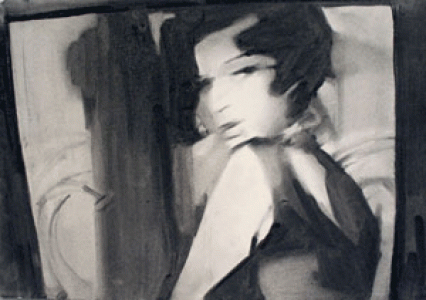Past Exhibition
Borrowed Moments
Olexander Wlasenko
May 2010
This exhibition features the starkly stylized drawings of Oshawa artist, Olexander Wlasenko. For fifteen years Wlasenko has been creating artworks based entirely on still images from films and archival photographs. Intense and perplexing, these borrowed moments seem at the same time to be familiar and elusive.
Wlasenko’s choice of subject, his source imagery, is the first puzzle the viewer encounters when looking at these drawings. Momentary images, captured first through a lens, are extracted from the narrative where they first were created. Each drawing is about the film or photo it depicts, but it is also about the stories they are telling. Two lovers kiss; a tense dialogue marks a dramatic twist in a plot; or everyday scenes are glorified. The original sources emanate from two distinct pools: Soviet propaganda imagery and European art house films. In both, the visuals are full of intense stylizations intended to make a much more subtle and complex contribution to the overall message of their authors. Innuendo and subtext run throughout both genres, although for very different ends.
Wlasenko’s drawings are much like peering through a microscope. We are looking intently at a very little thing, taken entirely out of context. We are searching for visual clues that will gives us a better understanding of the larger whole. The single film frames – one out of a sequence of maybe 100,000 – almost always depict a character, poised in a moment. Each is seen in profile or even from the back, because they are not engaged with us, the viewers of the film or the viewers of these drawings; they are engaged with another character and another action somewhere else beyond the scope of Wlasenko’s studious presentation.
We are left to wonder about the story within the borrowed films: who is she listening to? what is being said? what will happen next and to whom? But we also have to wonder about the image’s provenance. What is the agenda and backstory behind the impossibly radiant, smiling farm workers? Instantly recognizable as a work of Socialist Realism, they are begging for deconstruction. Likewise, an on-screen kiss from an unnamed dramatic film is reflected in a mirror by its auteur. These layers of frozen meaning are left as open, opaque questions in Wlasenko’s rendering.
But other levels of meaning emerge at the same time, possibly to replace the meanings that have drifted out of our reach by this act of displacement. The stills appear as though they were being projected, complete with the distortion that the projector and the edge of the screen always create (particularly in the viewing of home movies) but which we have trained ourselves well to ignore. The dark shadows and edges remind us that it is not we who are looking at these films, but Wlasenko. He is looking and selecting, building his own inventory of images and composing his own narrative. It is a narrative wrapped up in his heritage as the child of Ukranian immigrants with a history of national suffering. But there is a history here that we all share, that includes growing up in an era of lens-based imagery. The evasive truthfulness of the recorded image, from the Zupruder film to the moon landing, or from government propaganda to the nouvelle vague in cinema, is instantly recognizable in these idiosyncratic, personal, handmade images. (Literally handmade, since he creates them entirely by rubbing one finger dipped in dry pigment across the paper.) Like many artists in the media age, Wlasenko has chosen to look for truth in the multiple layers of meaning that emerge from pre-existing images and from a time gone by. His success, however, is rooted in his own intense connection to the potential of images through his upbringing and the immediacy of his craft.
Curated by Ilse Gassinger, essay by Geoffrey Shea
Wlasenko earned a Master of Fine Art at the University of Western Ontario in 2000. Prior to this, he graduated with distinction from the Ontario College of Art in 1994, going on to complete a degree in Fine Arts at the University of Guelph. From 2000 to 2008 he worked as Assistant Curator and Curator of the Thomas Bouckley Collection of Historical Photographs at The Robert McLaughlin Gallery in Oshawa. Currently he is the curator at the Station Gallery in Whitby, Ontario. Wlasenko has exhibited extensively in Canada and internationally. He is the recipient of several drawing awards and arts council grants, and his work has been sold to private and public collections.
www.olexander.ca

